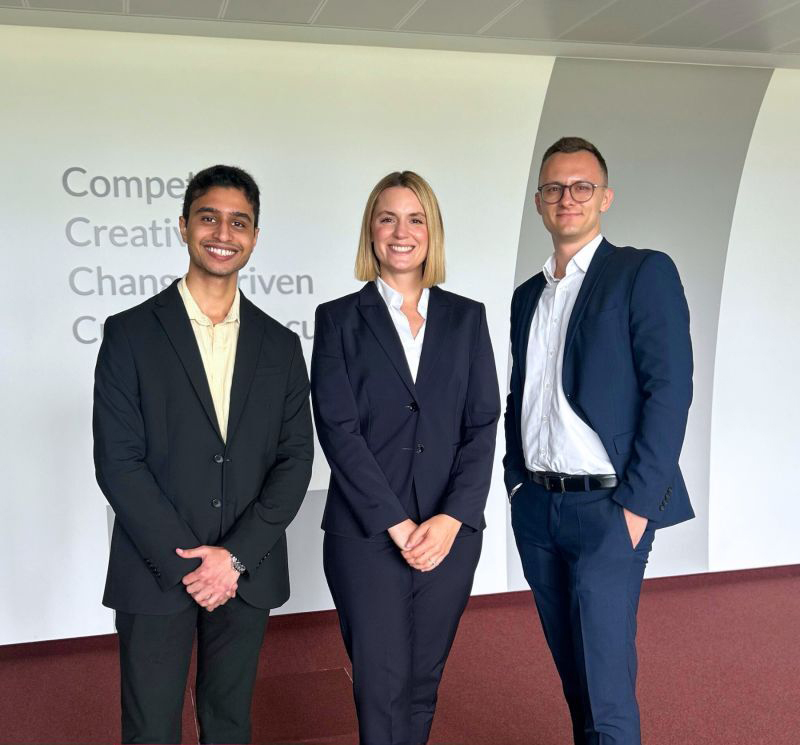I’m Taha Zulfikar and am currently a Consultant at 4C Group in Munich. I got into this line of work after my Master of Management at the Technical University of Munich, Germany. I spoke with Leap about my journey for their expert student series—Indians who had studied abroad recently and are still in that country pursuing their dreams—because I want to help others wanting to take the same career jump that I made.
Decision to go to Germany
I was born and brought up in Chennai and always wanted to be an engineer. During my bachelors at the SRM Institute of Science and Technology in automobile engineering, I realised that I wanted to have a career in between technical and management, so I started looking up courses and my initial shortlist locations were the US, the UK and Europe.
I paid a lot of attention to Germany because of the automotive background that the country already has in comparison to say the Netherlands or Italy. But I asked a few people, looked up online on a few forums and found out Europe and especially Germany is on the rise and TUM especially is ranked pretty high in Europe for its management programs.
The US has a good amount of universities that are too expensive and the quality of education that I was getting in Germany and the one that I would get in the US would be on the same level. But I would be spending like 100x probably, even more. So that is what prompted me to choose Germany.
Choose your dream country
When do you want to study abroad?
What's your highest level of education?
Select you current city
How Leap will help you
Personalised University Shortlist
Express Applications with Quicker Admits
End-to-End Application Support
Culturally shifting from from India to Germany
The most important point is that you need to know the language, because without it you basically cannot move around. You will have almost no social life.
And while you’re learning, when you have zero clue about the language, you can survive in Munich because it is a big student city, and has a lot of international students. However, I heard personally from like a lot of people who move into some cities like smaller cities where there are the unis and all and over there they find a very hard time integrating well with people. A plus point for me because I was in Munich, a big city, a lot of people, so not an issue.

Working as a student
Another benefit is that You are allowed to work here while studying, which is not allowed everywhere around the world. Basically, once I came over here, I did not need an extra penny from back home.
I was working part time and this does not mean I was doing odd jobs. I was actually working in the proper companies and fields relevant to the course that I was doing. I gained experience while I studied and made money on top of it. So by the time I finished my education, if I compared myself to someone who's graduated from a US college or a UK college, I already had more experience than them.
Getting internships
Self-searching and forums like the student job boards. Every department has their student job boards so they'll put up these industry tie-ups so they have some companies you know advertise their jobs. LinkedIn is very helpful in that aspect too and there are certain other specific websites that are Zen jobs or StepStone. Add to this visiting your faculty's website and this should be more than enough to get a nice student job.
Almost everyone that I know was working some time or the other during the course. The way the program is structured you have a lot of free time so you get enough time to work along with having sufficient time to attend classes, to attend lectures, and do your homework.
Jobs after course
I looked out for career fairs that were offered by the university. The drawback with these career fairs is that they don't take place so often, they're like once or twice a semester. So, if you kind of miss it, then you have to wait for the next one, and you don't get that big of a choice also of companies. But the plus point is you get direct contact with them. They give you the person of contact directly. So you can reach out to them, tell them, hey, I'm looking for a job. Sometimes they even screen your CV on the spot and they give you a date for the next call or something. So the process is faster if you do it via a career fair
The rest is the same: look up on the student job boards, look up on LinkedIn. References help a lot, so do find out if your peers or seniors have gotten a job, and reach out to them.
Also, if you have done an internship, if that company is looking for someone or if you perform good enough, they are more than happy to promote you to a full-timer.
Tips for CV
This is very country specific. Germany has a standard format of CV. So mostly if we look up online and if we look up for a resume CV, we get the American format where they explicitly say okay don't put up your pictures, everything should be in this line format bullet format, however the German format is needs a picture, it should be on this side, we need things to be you know reverse chronological order, so make sure it's according to whatever the guidelines are. The guidelines are available online.
Advice to students planning to study in Germany
It always comes back to the language. I was also able to find a job only because I knew the language. I would say not only Germany, if you're moving to Europe, except the UK ofcourse, you need to know the local language because without that, you might get through uni, but after that, it's close to impossible to kind of survive. Like job hunting would be astronomically more difficult for me if I didn't know the language because I would be limiting myself.
Financing your education
Most student jobs you get a 20 hours a week contract because that's at least the allowable limit for international students. You get paid by the hour and if I'm not wrong the current minimum wage is 12 euros but if you're working in a proper company you'd be paid somewhere between 15 to 20 at least if you're lucky enough.
That roughly translates to around after taxes in hand, you'd get around say 1200 to 1400 euros per month. Now coming on the expenses side, if you are living in one of the student accommodations, you'd be paying close to 300 to 400 euros in a big city, but if you're in one of the smaller cities, it'd be cheaper.
Then health insurance was another close to 150. So that's around 400+ 150. That was my fixed costs. Then for transportation, initially we had a semester ticket, which was 200 euros per semester. Now there's this thing called the Deutschland ticket or the German ticket, which is basically 50 euros per month and gives you access throughout Germany. And once a semester you pay like this administrative fee depending on the University. You don't pay any other fee.
These were my fixed costs. And beyond that, initially I tried to cook as much as possible to save on cost because eating every day outside is not so affordable. I mean there are these canteens in the university but they're not as cheap as one would think. So that would be another couple of hundred Euros.
So at the end of the day after all my expenses are accounted for, I would still have a surplus of around a couple hundred euros in the worst case.
What kind of emotional make-up should you have to study in Germany?
When I first came over here in Germany, it was a double whammy for me, because I didn't know anyone, and I came during the winter. You barely get to see the sun because the sun comes out at 8 but by the time it's 4pm it's again dark. It was also COVID time, so I was not even able to go out so much.
I was lucky enough to be in a student accommodation with a lot of nice people who interacted well with me. For loneliness, the most important thing I would say is to get into student accommodation.
A lot of people, when they come over here, look for shared flats with one or two people. If that works for you it works for you, but for some people, they find a couple of people and all of them are to themselves. Then it becomes a bit difficult, especially in your first couple of months to roam around and meet new people.
But once you cross that stage, when you're independent, you already have this group of friends and it's all good. I’m really happy now.















Have Questions? Get Guidance to reach your Dream University
Connect with India's finest counsellors and biggest study abroad community.
Get Guidance